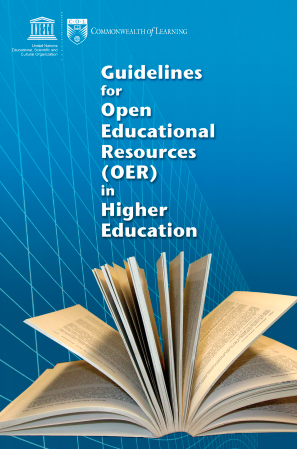
Today UNESCO and the Commonwealth of Learning jointly released the policy document Guidelines for Open Educational Resources (OER) in Higher Education. The purpose of the guidelines is “to encourage decision makers in governments and institutions to invest in the systematic production, adaptation, and use of OER and to bring them in to the mainstream of higher education in order to improve the quality of curricula and teaching and to reduce costs.”
UNESCO and COL note, “Open Educational Resources are teaching, learning or research materials that are in the public domain and released with an open license (such as Creative Commons). They allow communities of practitioners and stakeholders to copy, adapt and share their resources legally and freely, in order to support high-quality and locally relevant teaching and learning.”
The guidelines indicate how the potential of OER can be harnessed to support quality teaching and learning by higher education stakeholders, including governments, higher education institutions, teaching staff, students, and quality assurance, accreditation, and academic recognition authorities.
The Guidelines for OER in Higher Education inform the process leading up to the 2012 World OER Congress. That event is being organized by UNESCO and the Commonwealth of Learning, with support from the William and Flora Hewlett Foundation. The Congress will 1) work to promote the UNESCO/COL OER Policy Guidelines; 2) share the world’s best practices in OER policies, initiatives, and experts; and 3) release the 2012 Paris OER Declaration calling on Governments to support the development and use of OERs.
The UNESCO/COL policy document is licensed under a Creative Commons Attribution ShareAlike 3.0 license.







I would agreed with the ideas that are put forward in the Guidelines for Open Educational Resources. If someone is looking to learn the material to accomplish that should be readily available!
How about primary and secondary schools? The books they use are horribly ineffective, expensive, and the publishers seem to have some sort of stranglehold on state and district textbook approval/adoption committees.
Is there somewhere where I can get the raw reusable sources (ie. not the PDF) for this material?
http://www.col.org/OERGuidelines now offers a link to a WikiEducator version of the Guidelines (“raw data”, as asked for, and also provided on a platform for sharing versions). We’re also working on producing an RTF for the COL site.
Hi Adam: please see a wiki version at http://wikieducator.org/Guidelines_for_Open_Educational_Resources_in_Higher_Education